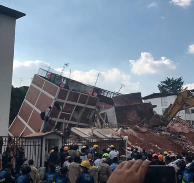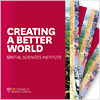Andrew J. Marx, Ph.D., Associate Professor of the Practice of Spatial Sciences and the Institute for Creative Technologies, and three members of the USC Spatial Sciences Institute (SSI) Human Security and Geospatial Intelligence Lab have published Detecting Destroyed Communities in Remote Areas with Personal Electronic Device Data: A Case Study of the 2017 Puebla Earthquake in the International Journal of Geo-Information.
Joining Marx as co-authors are Mia Poynor, Young-Kyung Kim and Lauren Oberreiter.
Poynor combined two SSI minors—one in Human Security and Geospatial Intelligence and another in Spatial Studies—with a major in Health and Human Sciences with an emphasis on international health. She recently completed intensive language and cultural immersion studies in Brazil as a Boren scholar.
Kim is a senior majoring in International Relations and Affairs and Computational Linguistics with a minor in Human Security and Geospatial Intelligence.
Oberreiter is a senior majoring in International Relations and Global Business.
The article describes the HSGI Lab’s algorithmic approach to leverage pseudonymized locational data collected from personal cell phones to detect the depopulation of localities severely affected by the 2017 Puebla earthquake in Mexico. The team tackled this project as a way to improve humanitarian responses to remote poor communities that are often disproportionately damaged by large-scale disasters.
The algorithm developed by the HSGI Lab team builds a pattern of life for village residents and then detects short term migration after the earthquake, successfully identifying 73% of severely damaged localities.
Marx said, “Using the notion of ‘every individual is a sensor’, this system helps humanitarian organizations understand the size and severity of a humanitarian disaster and provides a promising approach for first responders to prioritize response efforts to the most impacted communities.”





